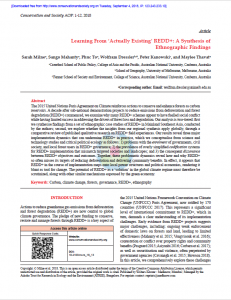Learning From ‘Actually Existing’ REDD+: A Synthesis of Ethnographic Findings
By Sarah Milne, Sango Mahanty, Phuc To, Wolfram Dressler, Peter Kanowski, and Maylee Thavat View PublicationWhy have many REDD+ schemes in SE Asia appear to have not only limited success in addressing the drives of forest loss and degradation, but in fact also fueled social conflict? A decade after sub-national REDD+ demonstration projects commented, this study reveals three major implementation dynamics that have undermined REDD+ in practice:
- Problems engaging governments, civil society and local forest users in REDD+ governance;
- Oversimplification of codification systems for REDD+ implementation that mismatch targeted societies and landscapes; and
- The consequent dissonance between REDD+ objectives and outcomes.
In effect, it appears that REDD+ programs have mapped onto existing local power structures and political economies, rendering it blunt as tool for change. Ongoing weak enforcement of domestic laws on forests and land have led to limited effectiveness, while contestation or conflict over property rights and community befits continue to challenge REDD+ progress. The potential of REDD+ as a ‘solution’ in the global climate regime must therefore be scrutinized, along with other similar mechanisms espoused by the green economy.

